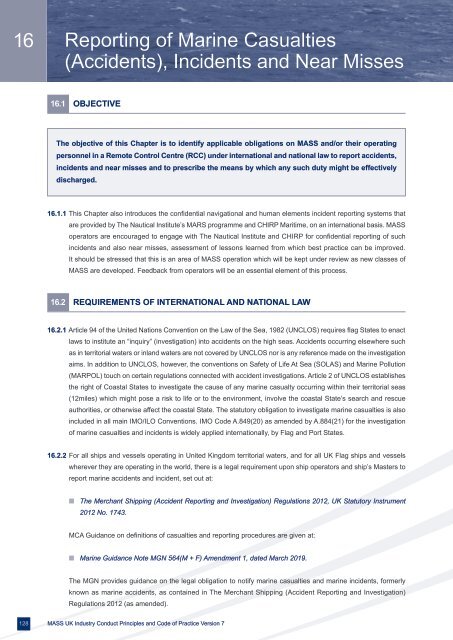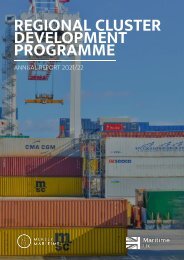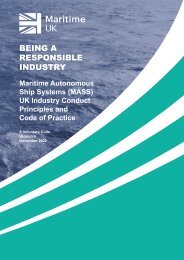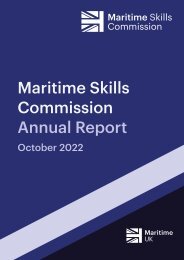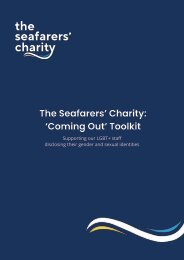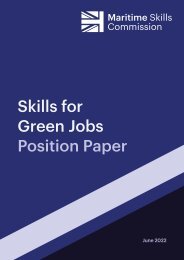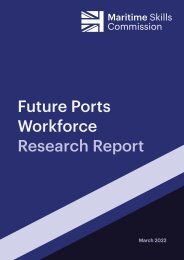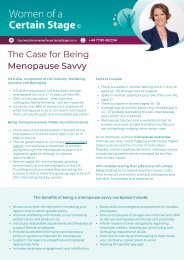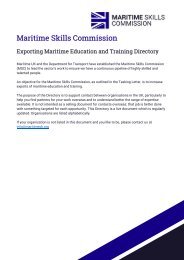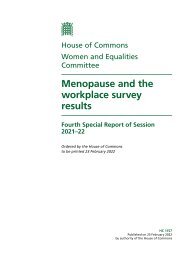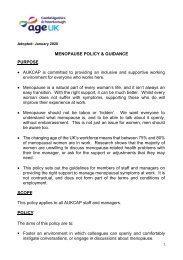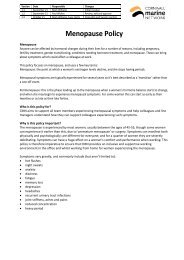COP_2023_V7_pages
You also want an ePaper? Increase the reach of your titles
YUMPU automatically turns print PDFs into web optimized ePapers that Google loves.
16<br />
Reporting of Marine Casualties<br />
(Accidents), Incidents and Near Misses<br />
16.1 OBJECTIVE<br />
The objective of this Chapter is to identify applicable obligations on MASS and/or their operating<br />
personnel in a Remote Control Centre (RCC) under international and national law to report accidents,<br />
incidents and near misses and to prescribe the means by which any such duty might be effectively<br />
discharged.<br />
16.1.1 This Chapter also introduces the confidential navigational and human elements incident reporting systems that<br />
are provided by The Nautical Institute’s MARS programme and CHIRP Maritime, on an international basis. MASS<br />
operators are encouraged to engage with The Nautical Institute and CHIRP for confidential reporting of such<br />
incidents and also near misses, assessment of lessons learned from which best practice can be improved.<br />
It should be stressed that this is an area of MASS operation which will be kept under review as new classes of<br />
MASS are developed. Feedback from operators will be an essential element of this process.<br />
16.2 REQUIREMENTS OF INTERNATIONAL AND NATIONAL LAW<br />
16.2.1 Article 94 of the United Nations Convention on the Law of the Sea, 1982 (UNCLOS) requires flag States to enact<br />
laws to institute an “inquiry” (investigation) into accidents on the high seas. Accidents occurring elsewhere such<br />
as in territorial waters or inland waters are not covered by UNCLOS nor is any reference made on the investigation<br />
aims. In addition to UNCLOS, however, the conventions on Safety of Life At Sea (SOLAS) and Marine Pollution<br />
(MARPOL) touch on certain regulations connected with accident investigations. Article 2 of UNCLOS establishes<br />
the right of Coastal States to investigate the cause of any marine casualty occurring within their territorial seas<br />
(12miles) which might pose a risk to life or to the environment, involve the coastal State’s search and rescue<br />
authorities, or otherwise affect the coastal State. The statutory obligation to investigate marine casualties is also<br />
included in all main IMO/ILO Conventions. IMO Code A.849(20) as amended by A.884(21) for the investigation<br />
of marine casualties and incidents is widely applied internationally, by Flag and Port States.<br />
16.2.2 For all ships and vessels operating in United Kingdom territorial waters, and for all UK Flag ships and vessels<br />
wherever they are operating in the world, there is a legal requirement upon ship operators and ship’s Masters to<br />
report marine accidents and incident, set out at:<br />
n The Merchant Shipping (Accident Reporting and Investigation) Regulations 2012, UK Statutory Instrument<br />
2012 No. 1743.<br />
MCA Guidance on definitions of casualties and reporting procedures are given at:<br />
n Marine Guidance Note MGN 564(M + F) Amendment 1, dated March 2019.<br />
The MGN provides guidance on the legal obligation to notify marine casualties and marine incidents, formerly<br />
known as marine accidents, as contained in The Merchant Shipping (Accident Reporting and Investigation)<br />
Regulations 2012 (as amended).<br />
128<br />
MASS UK Industry Conduct Principles and Code of Practice Version 7


